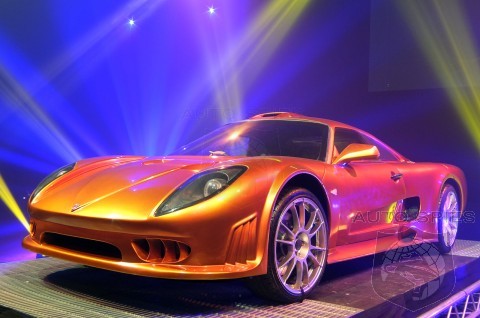
I couldn't link any of the images from this source, follow the link and click through the 52 pictures for the worst paint/body panel gap/wheel gap/fit 'n finish you've ever seen on a "super car"....especially one claiming to be capable of 340 MPH!!!
Jeremy Clarkson should be ashamed.
British manufacturer Keating Supercars has unveiled a prototype version of its new model, the Keating 'The Bolt'.
The Keating, which is a similar size to a McLaren P1, is powered by a 7.0-litre LS7 V8. The engine, sourced from General Motors, transmits its power to the rear wheels via a six-speed transaxle.
Standard output for that particular engine would be in the region of 505bhp and 470lb ft; Keating says its version produces around 640bhp. With a quoted kerb weight of 990kg (although Keating's engineers quote a more realistic 1200kg), an 800bhp version of The Bolt is claimed to accelerate from 0-60mph in 2.0sec.
Other notable performance-orientated features include coilover suspension and large ventilated disc brakes all round. The Bolt is also claimed to use 'space-age' lightweight materials, with production versions reputedly featuring carbon/Kevlar panels and an aluminium space frame, while a flat undertray should help reduce drag.
The company, which is run by Dr Anthony Keating, has produced three previous models - the SKR, the TKR and the ZKR. The total number of Keatings built, since the first model was launched in 2006, is claimed to be in the region of 15 cars.
"There are some XJ220 influences in the car," said Keating. "We went to see the Jaguar when it was launched. That's where my passion for all things automotive came from."
Despite being a low-volume sports car the Keating features creature comforts like power steering and air-con, and safety systems like ABS can be specified if desired.
The cars, which are hand built in a small workshop by a team of approximately three staff, are specified by customers from the ground up. Keating offers a twin-turbocharged version, outputting 1000bhp-2500bhp, and a 750bhp supercharged model is also on offer. Customers can, if so inclined, choose their own engine.
"We've also been working on another engine which uses a clutched supercharger system," said Keating.
Prices for the Keating aren't specific, due to the customisable nature of the car. A price of £750,000 is quoted for the 800bhp version, however. Keating hopes that larger sales volumes and refined production could bring the price of an entry level car down to £150,000, some £10,000 more than a Porsche 911 Turbo S.
In October Keating hopes to set a world record for a production car by taking a heavily tuned version of The Bolt to speeds in excess of 340mph. The brochure boldly states that the twin-turbocharged record attempt car will exceed '0.5 mach (340mph)', although Mach 0.5 at sea level is over 380mph.
Previously, the company's TKR, which used a 1750bhp twin-turbocharged engine from Nelson Racing Engines, is reputed to have hit 260.1mph at El Mirage in the United States.
Future plans include another rear-engined coupé, with 'more aggressive' front-end styling.
The Keating, which is a similar size to a McLaren P1, is powered by a 7.0-litre LS7 V8. The engine, sourced from General Motors, transmits its power to the rear wheels via a six-speed transaxle.
Standard output for that particular engine would be in the region of 505bhp and 470lb ft; Keating says its version produces around 640bhp. With a quoted kerb weight of 990kg (although Keating's engineers quote a more realistic 1200kg), an 800bhp version of The Bolt is claimed to accelerate from 0-60mph in 2.0sec.
Other notable performance-orientated features include coilover suspension and large ventilated disc brakes all round. The Bolt is also claimed to use 'space-age' lightweight materials, with production versions reputedly featuring carbon/Kevlar panels and an aluminium space frame, while a flat undertray should help reduce drag.
The company, which is run by Dr Anthony Keating, has produced three previous models - the SKR, the TKR and the ZKR. The total number of Keatings built, since the first model was launched in 2006, is claimed to be in the region of 15 cars.
"There are some XJ220 influences in the car," said Keating. "We went to see the Jaguar when it was launched. That's where my passion for all things automotive came from."
Despite being a low-volume sports car the Keating features creature comforts like power steering and air-con, and safety systems like ABS can be specified if desired.
The cars, which are hand built in a small workshop by a team of approximately three staff, are specified by customers from the ground up. Keating offers a twin-turbocharged version, outputting 1000bhp-2500bhp, and a 750bhp supercharged model is also on offer. Customers can, if so inclined, choose their own engine.
"We've also been working on another engine which uses a clutched supercharger system," said Keating.
Prices for the Keating aren't specific, due to the customisable nature of the car. A price of £750,000 is quoted for the 800bhp version, however. Keating hopes that larger sales volumes and refined production could bring the price of an entry level car down to £150,000, some £10,000 more than a Porsche 911 Turbo S.
In October Keating hopes to set a world record for a production car by taking a heavily tuned version of The Bolt to speeds in excess of 340mph. The brochure boldly states that the twin-turbocharged record attempt car will exceed '0.5 mach (340mph)', although Mach 0.5 at sea level is over 380mph.
Previously, the company's TKR, which used a 1750bhp twin-turbocharged engine from Nelson Racing Engines, is reputed to have hit 260.1mph at El Mirage in the United States.
Future plans include another rear-engined coupé, with 'more aggressive' front-end styling.


Comment